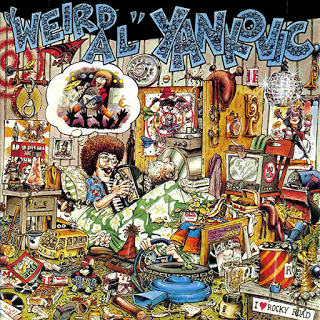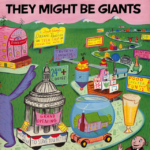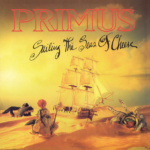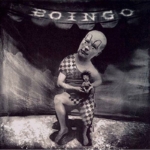
Ha! You know, for the longest time I wanted to write about Weird Al but I could never bring myself to do it. I write about guys like Zappa and They Might Be Giants and I attempt to make cases against the “novelty music” label that plagues these off-the-wall acts and everyone else like them, but what do you do when you think about a guy like Weird Al — a modern day honest-to-God unapologetic novelty act? How is it fair to take him seriously, give critical thought to his albums full of comedy music, and lump him in with actual musicians who make careers out of real, genuine artistry and talent?
Easy. Because, in my opinion, we can and should legitimize Weird Al as a real musician, plain and simple. You might know him only as the annoying accordion-wielding parody guy (influenced and elevated into mainstream success by the annoying Dr. Demento) who turns chart-topping hits like Michael Jackson’s “Beat It” and MC Hammer’s “U Can’t Touch This” into goofy songs about food and television. And, for the most part, this is all the casual observer needs to know. Digging deeper reveals a steady and successful career spanning four, almost five, decades; a career just as active now as it was when it started. Albums contain about a 50/50 distribution of full-on parody songs and original material, so it’s not all writing fart jokes over Nirvana songs. His loyal and talented backing band has basically remained unchanged since the beginning (Jim West on guitar, Steve Jay on bass, Jon “Bermuda” Schwartz on drums, adding Ruben Valtierra on keyboards in 1991), and all together they put on one hell of a live show. And, if you’re stubborn in your stance that he’s just one big gag and have nothing else positive to say about him, at least you have to admit he is consistent. And that’s saying quite a lot about an individual who just turned 60 years old this past October and therefore, more than most people in his business, needs to keep his finger on the pulse of pop culture in order to survive. And he’s really good at it, too. Adequacy!
Weird Al appeals to all ages, but the best time of your life to be steeped in his irreverent, nerdy offerings that deconstruct music just as much as embrace it would probably be the pre-teen through teenage years. After that, I doubt newcomers would get much of a religious experience from it, but oldcomers will never ever grow out of it. Living proof right here! *points to self, the smirking loathsome bastard* … still skeptical? OK, fine. How about this approach then: treat Weird Al as a gateway artist. His albums display a generous diversity of musical styles, often but not always coinciding with the times, and at best young enthusiasts may find themselves interested in checking out artists and bands that Weird Al saw fit to pay homage to over the years. Chances are good that if you like a Weird Al album from 2014 you’re also going to like a Weird Al album from 1985 regardless of outdated pop decisions. Longevity!
So let’s get right into “Weird Al” Yankovic, his bright-eyed and bushy-haired self-titled debut! Weird Al’s origin story is as close as you’d get to the early-’80s equivalent of sudden Youtube fame: Dr. Demento speaks at Weird Al’s high school, Al accosts him with homemade bedroom recordings of his accordion-accompanied solo efforts, Dr. Demento not only listens to the recordings but likes them and plays them on his own radio show, invites Al as a guest a few times over the years, Al tours with Dr. Demento’s stage show, Al gets noticed by nightclub managers and various outliers in the music industry that use their connections to get Al some recording studio time. OK, so not “sudden” Youtube fame. This is all over the span of roughly seven years, and in the meantime Al finishes school and goes to college and never really considers a full-fledged music career until it becomes an accidental reality. This whole slow burn to humble fame translates perfectly to his humble debut, a collection of earnestly crafted material that only a humble dork in his early 20s from moderately religious/conservative middle-class, suburban Los Angeles can earnestly craft. 30 minutes of enjoyable and wholesome, albeit amateur and shallow, comedy pop songs.
Out of ten tracks, exactly half are direct parody songs: “Ricky” (“Mickey” by one-hit wonder Toni Basil), “I Love Rocky Road” (Joan Jett’s “I Love Rock ‘n’ Roll”), “Stop Draggin’ My Car Around” (Stevie Nicks’/Tom Petty’s “Stop Dragging My Heart Around”), “My Bologna” (The Knack’s “My Sharona”) and “Another One Rides the Bus” (Queen’s “Another One Bites the Dust”). Bonus points to Weird Al for unintentional song-selection longevity, since four of those five are still extremely well-known 25 years later and one of them is kinda sorta well-known enough I guess maybe but probably not. I’ll let you, the humble reader, decide which are which.
The other half of the tracks are bona-fide Yankovic originals! Now, as time goes on Al will tend to frame his originals around the sound of other existing artists, so they’re pastiches instead of direct parodies (which have been termed in the canon as “style parodies”). So, for example, “Dog Eat Dog” off of the fourth Weird Al album Polka Party! is a clear Talking Heads style parody that, while maintaining a fully original melody and lyrical foundation, incorporates heavy elements of “Once in a Lifetime” and “And She Was” while aping and exaggerating David Byrne’s desperate, yelping vocal style. Bottom line: come for the direct parodies and stay for the style parodies, I always say! Those are far and above the best parts of the Weird Al catalogue! But alas and oh no! Where are all the style parodies on “Weird Al” Yankovic?! According to the internet, “Happy Birthday” is a Tonio K style parody! But who the fuck is Tonio K?! BOOOOOOOOO! Not impressed! However, “Happy Birthday” is the best song on this album so perhaps that adds credence to my bold “style parodies are always the best songs” claim anyway. The other originals are “Gotta Boogie” (thin post-disco built around a single, weak joke), “Buckingham Blues” (generic harmonica blues about the royal family, inspired by John Mellencamp’s “Jack & Diane”), “The Check’s in the Mail” (the first of many of Yankovic’s jabs at relatable white-collar corporate career shenanigans, something I doubt he can actually even marginally relate to), “I’ll Be Mellow When I’m Dead” (catchy and surprisingly sincere song about Al’s feelings at the time regarding the early ’80s yuppie lifestyle), and “Such a Groovy Guy” (one big, classy, public knock at his then-girlfriend’s ex). None of these are typical style parodies. Further still, none of these are a polka medley! Polka medleys are a Weird Al staple! Early installment weirdness! Aaaaahhhh!
OK, so is it all funny? Kinda sorta. I suppose the whole point of Weird Al’s comedy albums is to get a laugh out of them instead of, you know, dissecting them and appraising them on their musical merits like some basement-dwelling neckbeard. So, hereby and hitherto, all the Weird Al albums will be evaluated based on BOTH the music and the humor. And “Weird Al” Yankovic, the album that started it all…isn’t very musically interesting and isn’t very funny!
Fact of the matter is, Weird Al got much better at this very quickly. The first album is a mess of immature ideas, mediocre lyrical wordplay, and shoddy production. If the rest of his career followed this trajectory then no one would know who he was today. BUT, I gotta give the guy credit for putting himself out there by being no one else but himself and doing nothing but what he wanted to do. As time goes on he will gain the non-ironic respect of everyone from Kurt Cobain to Lin-Manuel Miranda. For all you know Alfred Matthew Yankovic has gotten laid more than Wilt Chamberlain. But, steer clear of his debut album until you’re already a fan, for the love of God.







Click here to ridicule this post!